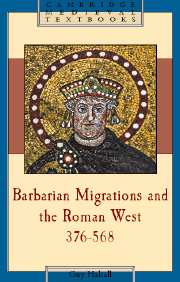Book contents
- Frontmatter
- Contents
- List of maps and figure
- Acknowledgements
- A note on spellings
- Part I Romans and barbarians in the imperial world
- 1 How the west was lost and where it got us
- 2 Defining identities
- 3 The late Roman Empire in the west
- 4 Society beyond the frontier
- 5 Romans and barbarians before 376
- Part II A world renegotiated: Western Europe, 376–550
- Part III Romans and barbarians in a post-imperial world
- Appendix: Gildas' narrative and the identity of the ‘proud tyrant’
- Bibliography
- Index
- Key to map 3 on page 75
- Cambridge Medieval Textbooks
1 - How the west was lost and where it got us
Published online by Cambridge University Press: 05 June 2012
- Frontmatter
- Contents
- List of maps and figure
- Acknowledgements
- A note on spellings
- Part I Romans and barbarians in the imperial world
- 1 How the west was lost and where it got us
- 2 Defining identities
- 3 The late Roman Empire in the west
- 4 Society beyond the frontier
- 5 Romans and barbarians before 376
- Part II A world renegotiated: Western Europe, 376–550
- Part III Romans and barbarians in a post-imperial world
- Appendix: Gildas' narrative and the identity of the ‘proud tyrant’
- Bibliography
- Index
- Key to map 3 on page 75
- Cambridge Medieval Textbooks
Summary
SABA, ROMANUS AND GUNTRAMN BOSO: THE PROBLEMS OF GOVERNMENT
The rulers of the Gothic kingdoms had decided to persecute the Christians, and ordered religious ceremonies that they would find unacceptable. In refusing to participate, the Christians would reveal themselves and, by spurning communal ritual, apparently state that they were neither part of the community nor interested in its well-being. This would bring down their neighbours' enmity upon them. However, as with the last Roman persecutions of Christians, things did not quite work out that way. One Gothic community decided to cheat their leaders at the ritual feast by giving their Christians meat that had not been sacrificed to the gods and thus would not upset Christian sensibilities. One Christian, Saba, refused to go along with this deception and made a public statement of his belief, adding that anyone who did participate in the feast was not a proper Christian. The elders, unsurprisingly, threw him out of the village.
Next, at another communal sacrifice overseen by a political leader of a higher level, the local Goths swore that there were no Christians in their midst, again deciding to leave them in peace. Saba (having returned to his village) thwarted them, striding into the meeting and declaring himself a Christian. The unnamed ‘persecutor’ asked the villagers whether Saba was a rich man, to which they replied that he had ‘nothing except the clothes he wears’. Declaring that Saba was no threat to anyone, the ‘persecutor’ again had him expelled.
- Type
- Chapter
- Information
- Barbarian Migrations and the Roman West, 376–568 , pp. 3 - 34Publisher: Cambridge University PressPrint publication year: 2007



